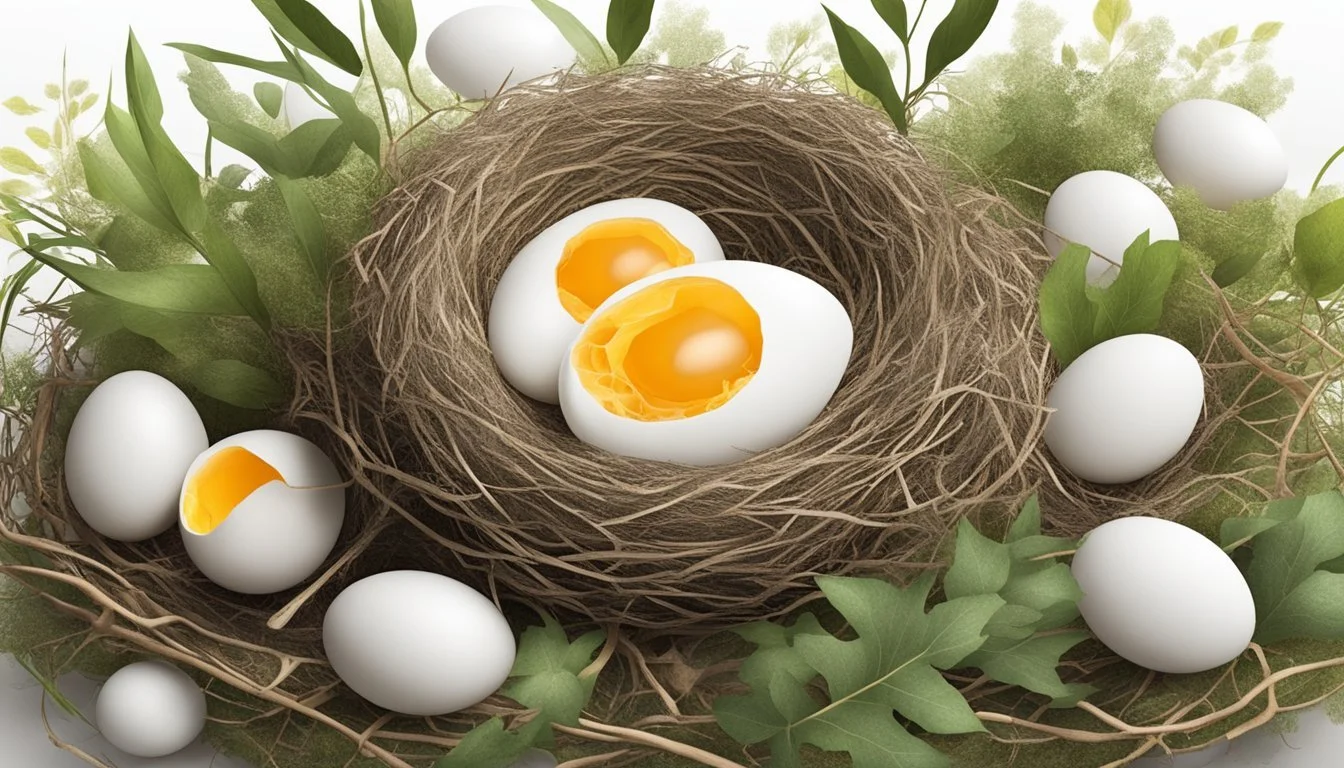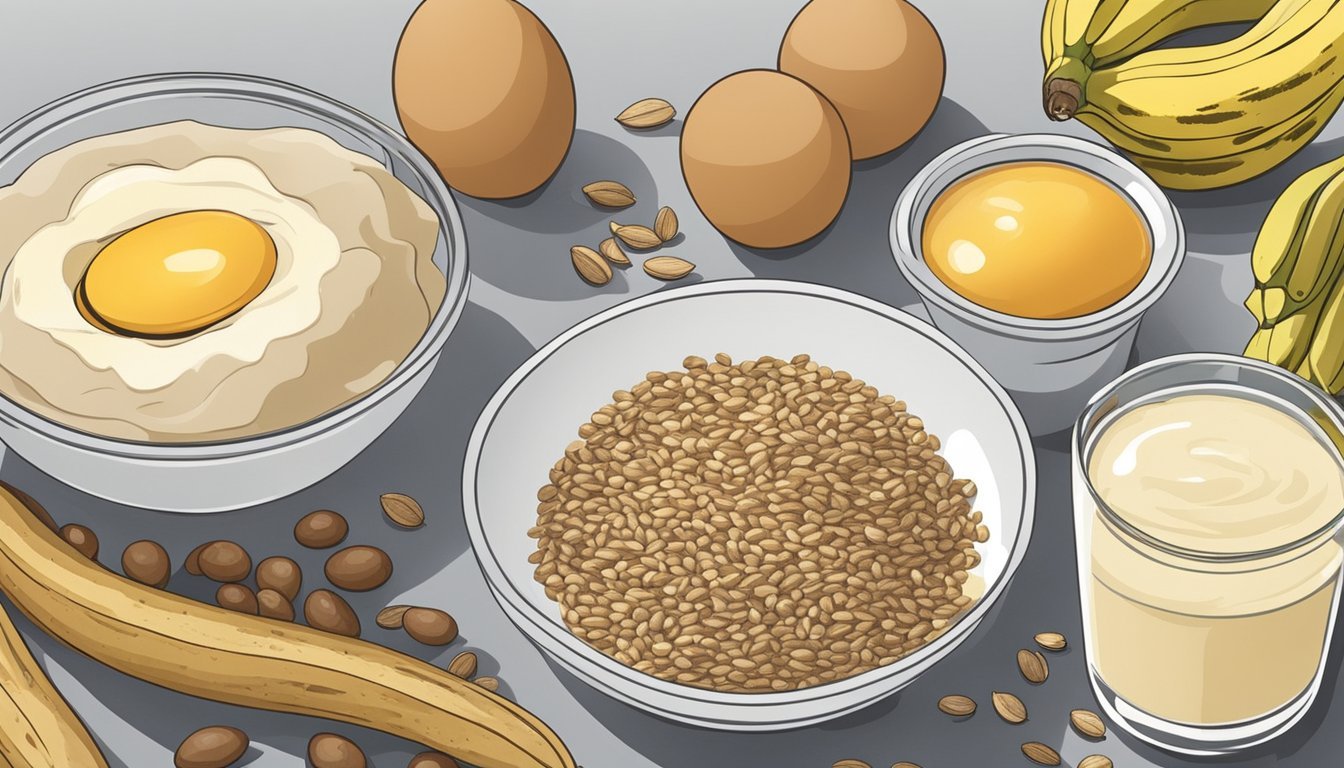Goose Eggs Substitutes
The Best Alternatives for Baking and Cooking
For those who love cooking and baking, exploring different kinds of eggs can be an exciting adventure. Goose eggs, known for their larger size and richer texture, can bring a unique twist to many recipes. When a recipe requires a more moderate egg size or a lighter texture, substituting goose eggs with alternatives like chicken eggs or even vegan options can help achieve the desired results.
In recipes where volume and texture play a crucial role, chicken eggs can stand in for goose eggs effectively. For every large goose egg, two large chicken eggs are typically an ideal swap. This maintains the balance while ensuring the dish doesn’t become overly rich or dense.
Those looking for vegan or allergy-friendly substitutes can turn to flax or chia seed "eggs." Combining one tablespoon of flax meal or chia seeds with three tablespoons of water creates a gelatinous mixture that can replace traditional eggs in many recipes. These options not only accommodate dietary restrictions but also contribute to a varied and inclusive culinary experience.
Understanding Goose Eggs
Goose eggs are larger and richer than chicken or duck eggs, providing unique nutritional benefits and versatility in culinary uses. Their physical characteristics, such as size and shell thickness, make them distinct.
Nutritional Profile
Goose eggs are highly nutritious, containing more protein, vitamins, and minerals than chicken or duck eggs. One goose egg typically weighs around 5 ounces. They are packed with vitamins A, D, and B12, and contain significant amounts of iron and calcium.
Their high cholesterol content may concern some, but the balance of nutrient density offers various health benefits. The higher concentration of yolk in goose eggs contributes to their rich and creamy texture, making them a valuable ingredient.
Culinary Uses
Goose eggs can be employed in numerous culinary applications. Their larger size and richer flavor enhance dishes like omelets, quiches, and custards. One goose egg can substitute roughly two large chicken eggs.
In baking, they provide added moisture and structure, making them excellent for cakes and pastries. For a simple preparation, a fried goose egg showcases their robust flavor. Their unique taste can turn everyday dishes into special delicacies, adding depth and richness.
Physical Characteristics
Goose eggs are significantly larger than chicken or duck eggs, with a typical weight of 5 ounces. Their shells are thicker and denser, providing better protection and a longer shelf life. The yolk is larger and more vibrant, contributing to the overall fattier and richer flavor of the egg.
Their size and robust shell may require stronger tools to crack open. Despite the challenge, the reward is a unique ingredient highly valued in specialty cooking. The vivid yolk and creamy texture stand out in culinary creations, making goose eggs a prized find.
Common Egg Substitutes
Egg substitutes offer solutions for those with dietary restrictions, allergies, or preferences, covering options from plant-based to protein-rich and commercial replacers. Each alternative provides unique properties for various culinary applications, ensuring recipes retain their desired texture and flavor.
Plant-Based Alternatives
Plant-based egg substitutes are ideal for those following a vegan diet or dealing with egg allergies. Chia seeds and flaxseeds are popular choices that mimic eggs' binding properties. To use, mix one tablespoon of either seed with three tablespoons of water to create a gel-like consistency. For recipes needing moisture, applesauce or mashed bananas can replace eggs, each offering a subtle flavor—though banana adds a distinct taste.
Silken tofu is another versatile substitute, particularly effective in dense recipes like brownies or quiches. Blend 1/4 cup of tofu to replace one egg. Aquafaba, the liquid from canned chickpeas, is excellent for recipes requiring whipped egg whites, such as meringues and mousses. Three tablespoons of aquafaba equal one egg white, providing a suitable foamy texture.
Protein-Rich Substitutes
Tofu and other legumes provide protein-rich alternatives for egg substitution. Firm tofu can be crumbled and seasoned to mimic scrambled eggs in savory dishes, while silken tofu suits baking needs, adding richness and moisture without altering flavor profiles significantly.
Another protein source, nut butter, such as peanut or almond, can be utilized in baking as a binding agent. Use 3 tablespoons of nut butter to replace one egg, though be aware of the nut flavor it might impart. These substitutes are beneficial not only for their binding properties but also for enhancing the nutritional content of the recipe.
Commercial Replacers
Commercial egg replacers are specifically formulated to mimic eggs' binding, leavening, and thickening properties. Products like Bob’s Red Mill Egg Replacer or Ener-G Egg Replacer are available in most grocery stores. These typically contain a blend of starches, soy lecithin, and alginates, which effectively substitute for eggs in various recipes.
To use a commercial egg replacer, follow the packet instructions for conversion ratios, usually involving mixing a specific amount of powder with water. These replacers are convenient and reliable for those new to egg-free baking, offering consistent results without altering the taste or texture of recipes significantly.
Substitute Roles in Recipes
Using substitutes for goose eggs in recipes often requires understanding the specific roles that eggs play. These roles include leavening and structure, moisture and fat content, and binding and emulsification.
Leavening and Structure
Leavening and structure are critical in baked goods like cakes, muffins, and bread. The proteins in eggs provide structural integrity, ensuring that the finished product holds its shape. Substitutes such as baking powder and carbonated water can create the necessary rise.
For each egg, 1 tablespoon of vinegar mixed with 1 teaspoon of baking powder can improve leavening. Carbonated water (1/4 cup per egg) can also introduce airiness, though it provides less structural support. Potato starch (2 tablespoons mixed with 3 tablespoons of water) can offer a similar effect in stabilizing baked goods.
Moisture and Fat Content
Moisture and fat are essential for recipes like custards, frittatas, and pasta. Eggs contribute to the smooth and rich texture due to their inherent fat and water content. Substitutes must mimic these properties to maintain the desired consistency.
Buttermilk or yogurt (1/4 cup per egg) can replicate both the moisture and fat content. For a vegan option, mashed fruit (like bananas or unsweetened applesauce, 1/4 cup per egg) can be ideal for dense baked items. Alternatively, oil (1/4 cup per egg) provides necessary fat without extra moisture.
Binding and Emulsification
In recipes like egg salad, frittatas, and custards, binding and emulsification help in holding ingredients together and creating a uniform texture. Goose eggs have strong binding properties due to their high protein content.
Flaxseed meal or chia seeds (1 tablespoon mixed with 3 tablespoons of water) can replace eggs, forming a gel-like consistency that aids in emulsification. Gelatin and agar-agar (1 tablespoon mixed with 3 tablespoons water) can also work, offering stability and uniformity. These alternatives ensure that the binding and emulsifying roles are met effectively without compromising on texture.
Special Considerations for Substitutions
When substituting goose eggs, it's crucial to address cooking techniques, texture and flavor adaptations, and any nutritional adjustments required. Goose eggs are richer and larger than chicken eggs, which can influence various recipes.
Cooking Techniques and Substitutes
Goose eggs are often used in dishes like omelets, fried eggs, and hard-boiled eggs due to their size and richness. When substituting, silken tofu and chickpeas are popular options. Silken tofu can mimic the consistency of beaten eggs and works well in egg salads and mayonnaise preparations. For poached or boiled substitutes, a combination of flaxseed and water provides a firmer texture while maintaining nutritional value.
Texture and Flavor Adaptations
Goose eggs have a unique texture and flavor, being richer and more flavorful than chicken eggs. Substitutes like silken tofu may lack the characteristic richness, but they provide a smooth texture. Chickpeas, when blended, offer a nutty flavor that complements savory dishes. Adjustments might be needed to achieve the same consistency, especially in recipes like omelets. Sometimes, adding a pinch of nutritional yeast can enhance the flavor profile.
Nutritional Adjustments
Goose eggs are more nutritionally dense than chicken eggs, providing higher levels of protein, fat, and cholesterol. When substituting, consider the health benefits and nutritional profile of the alternatives. Silken tofu and chickpeas contain protein with lower fat and no cholesterol, making them healthier. Tracking these changes ensures that substitutes meet the dietary needs intended by the original goose egg in recipes.
Practical Tips for Choosing Egg Substitutes
Selecting the right egg substitute involves understanding how different substitutes impact binding, leavening, moisture, and overall texture and flavor of the dish. This guide helps navigate these choices to achieve the best culinary results.
Making the Choice
Choosing an egg substitute depends on the intended culinary use. For binding in baked goods, ground flaxseed or chia eggs are excellent options. They help hold ingredients together but may affect texture slightly.
For leavening, look into commercial egg replacers, which contain leavening agents that mimic the rising effect of eggs. When moisture is a concern, applesauce or mashed bananas can add necessary hydration to recipes, though they may alter the flavor profile.
Substitution Ratios
Accurate substitution ratios are crucial. Here's a quick reference table:
Egg Substitute Measure for 1 Egg Ground Flaxseed 1 tbsp flaxseed meal + 3 tbsp water Chia Egg 1 tbsp chia seeds + 3 tbsp water Applesauce 1/4 cup Mashed Banana 1/4 cup Commercial Replacer Follow package instructions
Understanding these ratios ensures consistency across recipes and helps maintain the desired texture and flavor balance.
Trial and Error in Recipes
Trial and error are essential when substituting eggs. Some recipes may require tweaking to get the right binding or leavening effect. For instance, using flaxseed meal in baked goods may necessitate adjustments in baking time or liquid content.
Taste testing is vital. Trying out different substitutes in small batches can help determine the best match for the recipe. Keep in mind that certain dishes like frittatas and custards might demand more specific substitutes to achieve the traditional egg-like texture and flavor.
Experimentation combined with attention to detail significantly boosts success rates in egg-free cooking and baking, ensuring the end result is enjoyable and closely aligned with the original dish's intent.
Innovative Egg-Like Substitutes
Innovative egg-like substitutes offer a range of options for those seeking alternatives to goose eggs. These substitutes can cater to different culinary needs, from replicating the texture of eggs to accommodating specific dietary restrictions.
Edging Closer to Egg Texture
To achieve textures similar to eggs, several plant-based ingredients stand out. Aquafaba, the liquid from canned chickpeas, is a revolutionary choice. It can be used in various ways: 1 tablespoon mimics one egg yolk, while 3 tablespoons can replace a whole egg. Reducing it in a saucepan thickens its consistency, making it a versatile option. Silken tofu is another contender, offering a soft texture that works well in recipes like quiches and custards. Just puree 1/4 cup to replace one egg. Flaxseed and chia seeds are popular for their gel-like consistency when mixed with water. Combine 1 tablespoon of either seed with 2.5 tablespoons of water to form a binding agent.
Options for Specific Dietary Needs
For those with dietary restrictions, numerous substitutes are available. Flax Eggs, made by mixing ground flaxseed with water, are popular among vegans and individuals with egg allergies. Chia Seeds serve a similar purpose. Peggs, a plant-based powdered egg alternative made from chickpeas, flaxseed, and black salt, offers a nutrient-rich substitute without compromising flavor. Aquafaba remains a staple for its adaptability in vegan and egg-free diets. Other notable mentions include gelatin and nut butter—the latter of which can provide additional flavor in baked goods. These options ensure that dietary needs are not just met but exceeded, delivering delicious egg-free dishes.








